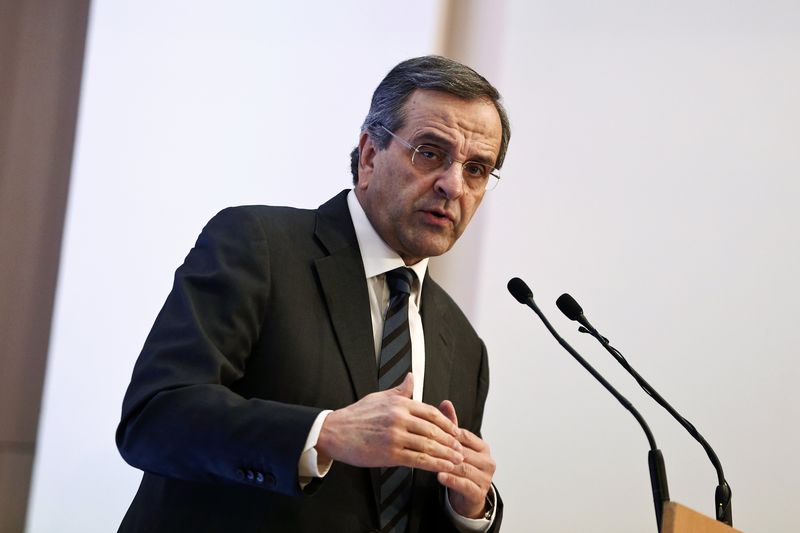By Renee Maltezou and Deepa Babington
ATHENS (Reuters) - The odds are stacked against Prime Minister Antonis Samaras in his gambit over electing a new Greek president, as only by persuading at least a few opposition lawmakers to rebel can he win the parliamentary vote - and avoid a likely political crisis.
However, analysts caution that the numbers could change quickly as the conservative premier tries to win enough support for the government candidate when parliament starts a three-stage vote for the head of state on Dec. 17.
Samaras brought forward the vote by about two months on Monday, taking a gamble because a rejection by lawmakers of his nominee will trigger snap parliamentary elections - which leftists opposed to Greece's EU/IMF bailout are likely to win.
To survive, Samaras needs 180 votes in the 300-seat chamber but he has the guaranteed support of only 155 lawmakers in the government parties. Both he and Alexis Tsipras, leader of the anti-bailout opposition Syriza party, are therefore courting independent lawmakers over the remaining 25 votes.
Even if Samaras wins over every independent lawmaker, which is unlikely since some have openly promised to vote against the government candidate, he would still fall short by one vote.
Indeed, if all opposition lawmakers vote against the government nominee, former European Union commissioner Stavros Dimas, that will be enough to bring down the government: the five opposition parties control 121 seats, the exact number needed to prevent a government win.
"The final outcome is likely to be decided by only a single-digit number of votes," said Blanka Kolenikova, an analyst with IHS Global Insight.
Political analyst John Loulis believes Samaras will fail. "Even if he manages to increase his tally of lawmakers he will not hit 180," he said.
Government officials privately and publicly have expressed confidence in finding the required support, and it is far from certain that no opposition lawmakers will rebel.
Two factors might work in Samaras's favour. A majority of Greeks are loathe to return to elections not much more than two years after the last polls, and many lawmakers have an incentive to support Samaras to avoid the risk of not being re-elected.
But if he fails, opinion polls suggest Syriza would win the elections that would follow. This would throw Greece's relations with the European Union and IMF, which bailed out the country, into crisis or lead to political paralysis if Syriza failed to find coalition partners.
TUG OF WAR
Lawmakers from three of the opposition groups - Syriza, the Communist KKE and the far-right Golden Dawn - are unlikely to vote against their parties.
However, two small opposition parties, the Democratic Left and the right-wing Independent Greeks, have suffered internal crises and could be vulnerable to having lawmakers poached.
Both parties say they will vote against the government. The Democratic Left, which quit the Samaras coalition in protest last year, is expected to ally with Syriza.
But in a sign of possible dissent, three Democratic Left lawmakers joined a group of independents last month in signing a document saying they would support Samaras's candidate on condition that elections are called in 2015. This signals they may be willing to strike a compromise with Samaras.
For now the biggest battleground remains the independents, most of whom are former members of the two ruling parties, Samaras's New Democracy and Socialist PASOK, or the Democratic Left.
Some like independent George Davris have openly come out in favour of the government. "We should show that a tug of war over this issue is unacceptable," he told Greek radio.

But many others have chosen not to show their hand. "I will follow my conscience," said a former Democratic Left lawmaker, Paris Moutsinas. "Right now, I don't see anything I can agree on in political terms."
(editing by David Stamp)